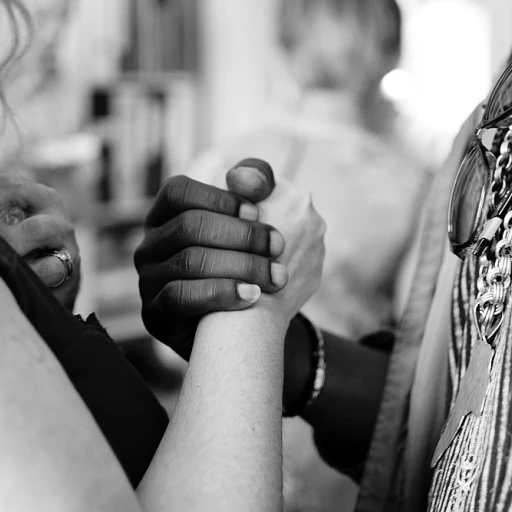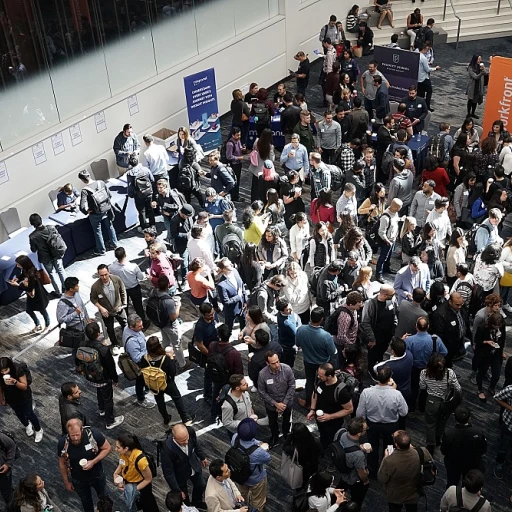
Understanding the importance of diversity interview questions
Why Diversity Interview Questions Matter in Today’s Workplace
Building a truly inclusive workplace is more than a statement—it’s a continuous commitment. Diversity, equity, and inclusion (DEI) have become central to how companies attract, hire, and retain talent. Interview questions focused on diversity and inclusion help organizations assess whether a candidate can thrive in a diverse team and contribute to an equitable environment. These questions are not just about compliance; they are about shaping a workplace where every team member feels valued and heard.
The Impact of Inclusive Hiring on Teams and Business Outcomes
Research consistently shows that diverse teams outperform less diverse ones in decision making and innovation. When interviewers ask thoughtful diversity interview questions, they send a clear message: the company values equity and inclusion. This approach helps identify candidates who can adapt to and enhance a diverse workplace environment. It also reduces the risk of unconscious bias influencing hiring decisions, leading to a more representative workforce.
- Workplace diversity leads to broader perspectives and better problem-solving.
- Inclusive interview questions help uncover a candidate’s ability to work in a diverse team.
- Equity and inclusion in hiring practices foster a sense of belonging for all team members.
Setting the Foundation for Effective DEI Interview Practices
Human resources professionals play a key role in shaping the candidate interview experience. By integrating diversity interview questions, they help ensure that hiring processes reflect the company’s commitment to an inclusive workplace. This foundation supports ongoing improvement, as discussed in later sections, and allows organizations to measure the effectiveness of their DEI efforts using analytics. For more on how analytics can drive better hiring outcomes, explore this insightful overview of human resources analytics in recruitment.
Key principles for crafting meaningful diversity interview questions
Building Questions That Reflect Real Workplace Diversity
Crafting meaningful diversity interview questions is about more than just checking a box. It requires a thoughtful approach to ensure that each question helps reveal how a candidate will contribute to an inclusive workplace environment. The goal is to understand not only what the candidate knows about diversity, equity, and inclusion (DEI), but also how they put these values into action when working in a diverse team.- Relevance to the role: Every question should connect to the actual work environment and team dynamics. For example, asking how a candidate has navigated differences in a previous team can show their real-world experience with inclusion.
- Open-ended structure: Questions that invite detailed answers, rather than simple yes or no responses, give candidates space to share their perspectives and experiences. This helps interviewers assess the depth of a candidate’s understanding of equity and inclusion.
- Focus on behavior and impact: Instead of theoretical questions, focus on practical examples. For instance, ask for an example answer about a time the candidate contributed to a more inclusive environment or addressed unconscious bias in decision making.
- Consistency and fairness: To ensure equity, use the same set of diversity interview questions for all candidates. This helps human resources teams compare answers objectively and reduces the risk of unconscious bias.
- Alignment with company values: Questions should reflect the company’s commitment to diversity equity and inclusion. This signals to candidates that the organization values a diverse workplace and inclusive team culture.
Encouraging Authentic Answers in the Interview
Candidates are more likely to provide honest, insightful answers when they feel the interview is a safe space. Interviewers should clearly communicate the company’s dedication to an inclusive workplace and explain why these questions matter. This approach helps candidates understand that their perspectives on diversity and inclusion are valued, not just as a formality, but as an essential part of the workplace environment. For organizations looking to streamline and improve their interview process, leveraging technology can help. Tools highlighted in exploring the most common campus recruiting software can support human resources teams in tracking candidate interview responses and analyzing trends in diversity interview questions. This data-driven approach ensures continuous improvement and supports the creation of a more inclusive environment for all team members.Common pitfalls to avoid when using diversity interview questions
Recognizing and Addressing Bias in Diversity Interview Questions
Even with the best intentions, diversity interview questions can sometimes fall short of their purpose. Human resources professionals and hiring teams need to be aware of common mistakes that can undermine efforts to build an inclusive workplace environment.- Unconscious bias in question design: Questions that unintentionally favor certain backgrounds or experiences can limit the diversity of answers. For example, asking about participation in specific cultural events may exclude candidates from different backgrounds. It’s important to ensure every question is relevant to the role and does not assume a particular cultural norm.
- Overly generic or vague questions: Questions like “How do you value diversity?” often lead to rehearsed or superficial answers. Instead, focus on specific scenarios or ask for an example answer that demonstrates real experience working in a diverse team or inclusive environment.
- Failing to connect questions to company values: Diversity, equity, and inclusion (DEI) interview questions should reflect the company’s commitment to an inclusive workplace. If questions seem disconnected from the actual work environment, candidates may question the authenticity of the company’s DEI efforts.
- Ignoring the candidate’s perspective: Sometimes, interviewers focus so much on what they want to hear that they overlook how the candidate might interpret the question. This can lead to discomfort or confusion, especially if the question is too personal or invasive. Always consider how a question might make a candidate feel and whether it encourages open, honest answers.
- Not evaluating the impact of questions: Without using analytics to review how interview questions affect decision making and hiring outcomes, companies risk perpetuating bias. Regularly analyze candidate interview data to identify patterns that may indicate bias or inequity in the process. For more on how hiring managers can support this, see this resource on the role of a hiring manager.
Using analytics to evaluate the effectiveness of diversity interview questions
Measuring the Impact of Diversity Interview Questions
Evaluating the effectiveness of diversity interview questions is essential for building an inclusive workplace. Human resources teams can use analytics to understand how these questions influence hiring decisions and the overall diversity, equity, and inclusion (DEI) strategy. One way to start is by tracking candidate responses and outcomes. For example, analyze how candidates from different backgrounds answer diversity interview questions and whether their responses correlate with successful hiring or long-term retention. This helps identify if the questions are fair and relevant for all people, or if they unintentionally favor certain groups.Key Metrics to Track
- Hiring rates by demographic group: Are your diversity interview questions helping to build a more diverse team?
- Candidate feedback: Collect feedback from candidates about their experience with diversity and inclusion questions. Do they feel the questions are relevant and respectful?
- Panelist consistency: Monitor if different interviewers interpret and score answers consistently, reducing unconscious bias in decision making.
- Retention and engagement: Track if new hires who excelled in diversity interview questions thrive in your workplace environment and contribute to an inclusive team culture.
Using Data for Continuous Improvement
Analytics can reveal patterns that inform adjustments to your interview process. For example, if certain questions consistently result in lower scores for candidates from underrepresented groups, it may signal a need to revise those questions for greater equity and inclusion. Regularly reviewing data helps ensure your interview questions support a truly inclusive environment and align with your company’s DEI goals. Incorporating analytics into your human resources strategy not only strengthens your hiring process but also demonstrates your commitment to diversity, equity, and inclusion in the workplace.Examples of strong diversity interview questions
Sample Questions That Foster Real Conversations
Developing strong diversity interview questions is essential for building an inclusive workplace. The right questions help you understand how a candidate will contribute to a diverse team and support equity and inclusion in your company. Below are some example questions that encourage candidates to share their experiences and perspectives on diversity, equity, and inclusion (DEI).
- "Can you share an experience where you worked with people from diverse backgrounds? What did you learn from that experience?"
This question helps reveal how a candidate values diversity and adapts to a diverse workplace environment. Look for answers that show openness, learning, and respect for different perspectives. - "How do you ensure your communication and decision making are inclusive when working with a team?"
This question explores the candidate’s awareness of unconscious bias and their ability to foster an inclusive environment. Strong answers often include specific strategies or examples. - "What does equity mean to you in the context of the workplace, and how have you promoted it in your previous roles?"
This question assesses the candidate’s understanding of equity and their commitment to creating an equitable workplace. Listen for answers that go beyond surface-level definitions and include real actions. - "Describe a time when you witnessed or experienced exclusion in a team. How did you respond?"
This question gives insight into the candidate’s approach to challenging situations and their willingness to support inclusion workplace efforts. - "How would you contribute to our company’s DEI initiatives if you joined our team?"
This question invites candidates to connect their values with your organization’s goals. Strong answers show a proactive attitude and understanding of your company’s diversity equity and inclusion priorities.
What Makes These Questions Effective?
These example questions are open-ended and encourage candidates to provide detailed answers. They are designed to go beyond generic responses, allowing you to assess how a candidate’s values align with your team’s commitment to diversity and inclusion. When evaluating answers, focus on:
- Specific examples from previous work or life experiences
- Evidence of self-awareness and willingness to learn
- Ability to work effectively in a diverse team
- Commitment to fostering an inclusive workplace environment
By using well-crafted diversity interview questions, human resources professionals can make more informed hiring decisions and support a culture of equity inclusion. Remember, the goal is to create a space where every candidate feels comfortable sharing their perspective, helping you build a truly inclusive and diverse workplace.
Integrating feedback and continuous improvement in your interview process
Building a Feedback Loop for Continuous Improvement
Creating an inclusive workplace is not a one-time effort. To ensure your diversity interview questions remain effective, it’s essential to gather feedback and use it to refine your process. This approach helps your company adapt to the evolving needs of a diverse workforce and supports ongoing equity and inclusion efforts.
- Collect feedback from candidates and interviewers: After each candidate interview, ask both the candidate and the team members involved about their experience. Did the questions feel relevant to diversity, equity, and inclusion? Were there any moments where the questions seemed unclear or uncomfortable?
- Analyze candidate answers for patterns: Use human resources analytics to review how candidates respond to diversity interview questions. Are there common misunderstandings or areas where answers lack depth? This can highlight where your questions may need adjustment.
- Monitor workplace outcomes: Track metrics such as new hire retention, team satisfaction, and perceptions of inclusion in the workplace environment. If your hiring process is truly inclusive, you should see improvements in these areas over time.
- Engage diverse team members: Involve people from different backgrounds in reviewing and updating your interview questions. Their perspectives can help identify unconscious bias or gaps in your approach, making your process more equitable.
- Iterate and communicate changes: When you update your interview questions or process, communicate these changes to everyone involved in hiring. Explain the reasons behind the updates and how they support a more inclusive environment.
By integrating feedback and leveraging analytics, your company can ensure that diversity, equity, and inclusion remain at the heart of your hiring process. This commitment not only strengthens your team but also contributes to a more positive and productive workplace diversity experience for everyone.











